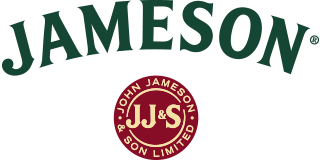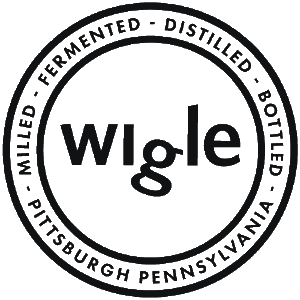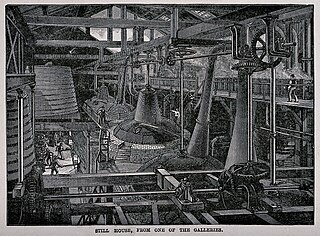
Whisky or whiskey is a type of distilled alcoholic beverage made from fermented grain mash. Various grains are used for different varieties, including barley, corn, rye, and wheat. Whisky is typically aged in wooden casks, which are typically made of charred white oak. Uncharred white oak casks previously used for the aging of port, rum or sherry are also sometimes used.

Bourbon is a type of barrel-aged American whiskey made primarily from corn (maize). The name derives from the French Bourbon dynasty, although the precise source of inspiration is uncertain; contenders include Bourbon County in Kentucky and Bourbon Street in New Orleans, both of which are named after the dynasty. The name bourbon was not applied until the 1850s, and the Kentucky etymology was not advanced until the 1870s.

Irish whiskey is whiskey made on the island of Ireland. The word 'whiskey' comes from the Irish uisce beatha, meaning water of life. Irish whiskey was once the most popular spirit in the world, though a long period of decline from the late 19th century onwards greatly damaged the industry, so much so that although Ireland boasted at least 28 distilleries in the 1890s, by 1966 this number had fallen to just two, and by 1972 the remaining distilleries, Bushmills Distillery and Old Midleton Distillery, were owned by just one company, Irish Distillers.

Rye whiskey can refer to two different, but related, types of whiskey:

Tennessee whiskey is straight whiskey produced in the U.S. state of Tennessee. Although it has been legally defined as a bourbon whiskey in some international trade agreements, most current producers of Tennessee whiskey disclaim references to their products as "bourbon" and do not label them as such on any of their bottles or advertising materials. All current Tennessee whiskey producers are required by Tennessee law to produce their whiskeys in Tennessee and – with the sole exception of Benjamin Prichard's – to use a filtering step known as the Lincoln County Process prior to aging the whiskey. Beyond the perceived marketing value of the distinction, Tennessee whiskey and bourbon have almost identical requirements, and most Tennessee whiskeys meet the criteria for bourbon.

Jameson is a blended Irish whiskey produced by the Irish Distillers subsidiary of Pernod Ricard. Originally one of the six main Dublin Whiskeys at the Jameson Distillery Bow St., Jameson is now distilled at the New Midleton Distillery in County Cork. It is by far the best-selling Irish whiskey in the world; in 2019, annual sales passed 8 million cases. It has been sold internationally since the early 19th century, and is available to buy in over 130 countries.

A microdistillery is a small, often boutique-style distillery established to produce beverage grade spirit alcohol in relatively small quantities, usually done in single batches. While the term is most commonly used in the United States, micro-distilleries have been established in Europe for many years, either as small cognac distilleries supplying the larger cognac houses, or as distilleries of single malt whisky originally produced for the blended Scotch whisky market, but whose products are now sold as niche single malt brands. The more recent development of micro-distilleries can now also be seen in locations as diverse as London, Switzerland, and South Africa.

Willett Distillery, also known as Kentucky Bourbon Distillers (KBD), Ltd., is a private family-owned and -operated company that produces bourbon and rye whiskey. Over the years the company has bottled whiskeys that range from 2 years of aging maturity up to 28 years.

The Catoctin Creek Distilling Company, which operates under the trade name of Catoctin Creek, is the first legal distillery in Loudoun County, Virginia since prohibition. The distillery is a certified organic and kosher microdistillery in Purcellville, Virginia that produces brandy, rye whiskey, and gin from local fruit, organic grain and Virginia wine.

Sazerac Company, Inc. is a privately held American alcoholic beverage company headquartered in Metairie in the metropolitan area of New Orleans, Louisiana, but with its principal office in Louisville, Kentucky. The company is owned by billionaire William Goldring and his family. As of 2017, it operated nine distilleries, had 2,000 employees, and operated in 112 countries. It is one of the two largest spirits companies in the United States, with annual revenue of about $1 billion made from selling about 300 mostly discount brands.
Benjamin Prichard's Tennessee Whiskey is a brand of Tennessee whiskey produced in the small community of Kelso, Tennessee in the United States. Although it is produced by one of only two distilleries operating in Lincoln County – and its unaged variation is named Lincoln County Lightning – Prichard's is not produced using the Lincoln County Process. Due to a special grandfathering exemption under a Tennessee law enacted in 2013, the Prichard's distillery in Kelso is the only producer allowed to label its product as "Tennessee Whiskey" without using this process. Prichard's whiskey is produced entirely using pot stills rather than column stills.

Wigle Whiskey is an artisan small batch whiskey distillery in the Strip District neighborhood of Pittsburgh. Wigle Whiskeys are the flagship products of the Pittsburgh Distilling Company, LLC, which is entirely family owned and operated.
Hood River Distillers is an importer, producer, bottler, and marketer of spirits based in the U.S. State of Oregon.
MGP of Indiana, formerly known as LDI, is a distillery in Lawrenceburg, Indiana, producing spirits for private label sale. These are sold under about 50 different brand names by various bottling companies, with a recent addition of their own products, Till Vodka, George Remus Bourbon, and Rossville Union Straight Rye Whiskey. The facility's largest customer is the London-based multinational beverage giant Diageo.

The production of distilled spirits in New Jersey has not been a large industry in the state. Strict alcoholic beverage control laws in place during and after Prohibition (1919–1933) prevented the industry from growing for almost a century. In 2013, the state passed a law creating a craft distillery license. and issued the first new distillery license since Prohibition to Jersey Artisan Distilling
House Spirits Distillery is an American craft distiller based in Portland, Oregon. It was founded in Corvallis in 2004 and moved to Portland in 2005. Its production facility and tasting room is located on Portland's Distillery Row, in the Central Eastside Industrial District. The distillery's flagship brand is Aviation American Gin, which comprised 80% of its production in 2012, and around 40% in 2016, after the company's move into a larger distillery facilitated a major expansion of production of its whiskey brand.

Collier and McKeel is a brand of Tennessee whiskey produced in Nashville. The whiskey was originally distilled by Tennessee Distilling Company, a corporation founded in 2009 in Franklin, Tennessee, by former Tennessee state representative Mike Williams. The brand was sold to North Coast Spirits, a California business group, in 2014, but distillation and other operations remained in Nashville.
Corsair Artisan Distillery is a small-batch distilling company located in Nashville, Tennessee, USA, and founded in Bowling Green, Kentucky, in January 2008. Corsair Artisan is owned and operated by Darek Bell and Andrew Webber, distillers and Nashville natives. The company has produced innovative spirits including buckwheat whiskey, quinoa whiskey, malted and smoked whiskies, multi-grain bourbons, barrel aged gin, red absinthe, naturally flavored vodka and spiced rum.
Master distiller is a title often used for a distilling expert or a key leader or owner at modern distilleries. The title doesn't have a fixed definition and can mean different things at different companies. Although the craft of distilling has existed for centuries throughout history, the term "master distiller" only dates back as far as the 1800s when it was first used to acknowledge the distilling expertise and knowledge a person gained after practicing and perfecting the craft of distilling for many years. In more recent usage, the term can have a much broader meaning and is sometimes used for owners and company leaders who run their companies but do not actively create the distilling recipes and processes used at their distilleries.

The following outline is provided as an overview of and topical guide to whisky:














